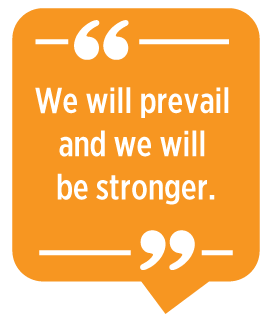From the President: Brought to You by the Letter V
by Deborah J. Short
 This month’s column is brought to you by the letter V. Those
of you who have watched Sesame Street may remember that
each episode features a letter or two and ends with a message like this. In
reflecting on November 2020 and looking toward December, I find no better
letter than V to suit this time.
This month’s column is brought to you by the letter V. Those
of you who have watched Sesame Street may remember that
each episode features a letter or two and ends with a message like this. In
reflecting on November 2020 and looking toward December, I find no better
letter than V to suit this time.
V is for
Virus. The COVID-19 virus has cast a long, deadly shadow on our year. We have
chronicled its disruptive and destructive force on education and the economy.
We have suffered and struggled yet done our best for our students, colleagues,
families, and friends. We can now also recognize its role in promoting
innovations and interconnections. So, some benefit has come from the
crisis.
V is for Virtual
Convention as well. Because of the ongoing pandemic, the TESOL Board
of Directors decided to hold our 2021 Convention remotely. Safeguarding our
members’ health is very important and continuing to bring you research and
pedagogical knowledge about effective English language teaching is equally so.
From 24–27 March, we will showcase 500 presentations, four or five keynotes,
and an abundance of networking opportunities. Recordings will be available for
you to watch for 60 days after the Convention ends. And 23–24 March, we will have
10 Preconvention
Institutes, with the Graduate
Student Forum on 23 March.
 V is also
for Vote. November saw an election in the United States that resulted in a vote
for a new head of government. We have issued a
statement declaring our hope that the Biden-Harris administration
will strengthen our TESOL community with more funding for public schools, more
attention to the needs of teachers of English learners, and an end to Visa bans
and the travel restrictions faced by foreign students and individuals from
certain countries, among other policy recommendations. With an English teacher
as first lady, we can hope more good will come.
V is also
for Vote. November saw an election in the United States that resulted in a vote
for a new head of government. We have issued a
statement declaring our hope that the Biden-Harris administration
will strengthen our TESOL community with more funding for public schools, more
attention to the needs of teachers of English learners, and an end to Visa bans
and the travel restrictions faced by foreign students and individuals from
certain countries, among other policy recommendations. With an English teacher
as first lady, we can hope more good will come.
V is notably
also for Vaccine. November brought the very welcome news of three effective
vaccines against COVID-19. We can now see a way out of this dreadful year and
look forward to a recovery. It will take time, maybe 6 months or more before
the vaccines are widely distributed and people are inoculated, and we won’t
return to the same life we had before the virus victimized us, but we will
prevail and we will be stronger.
Because, in
the end, V is for Victory. The vaccines will give us a victory over the virus.
TESOL’s vision
and values will be sustained. Our strategic
objectives and communities
of practice will be more vibrant and viable than ever.
I thank you
for your valor in these dangerous times. I wish you vim, vigor, and vitality
during the upcoming holiday season. And I wish you peace. ✌️
Deborah J. Short, PhD, is TESOL International Association president (2020–2021). She directs Academic Language Research & Training, LLC and provides professional development on academic literacy, content-based ESL, and sheltered instruction worldwide. She has led numerous research projects related to English learner education, codeveloped the SIOP Model, and served as series editor for several 6 Principles books.
TESOL Blogs
Interested in writing a blog for TESOL?
Read the submission guidelines and send us your post!
Check out some of the most recent TESOL Blogs:
|
6 Scaffolds to Support ELs in a Virtual Classroom, by Judie Haynes

According to my sources on #ELLCHAT, a Twitter discussion group for teachers of English learners (ELs), students are sitting in virtual classrooms during the pandemic, struggling to understand content-area information. It is critical for ELs to obtain comprehensible input from their teachers, and this has become increasingly difficult in a virtual setting. Read more. |
|
Bringing Civics to the Classroom With iCivics, by Jeff Kuhn

Hello and welcome to another edition of the TESOL Games and Learning blog! In this month’s post, we’ll explore iCivics, a website of classroom-friendly games that teach students about the workings of government. Former U.S. Supreme Court Justice Sandra Day O’Connor founded iCivics in 2009 in response to what she saw as decreased civic engagement. Since then, iCivics has created a variety of games that give players an understanding of systems of government and help them learn more about the democratic process. Read more. |
|
6 Ways to Build Fluency in Second Language Writing, by Betsy Gilliland
 What Is Fluency in Writing? What Is Fluency in Writing?
When asked what their goal is in learning a language, many learners say they want to be fluent in both speaking and writing. In everyday discussions, we often think of fluency as a reflection of a writer’s ease and comfort with writing. In second language acquisition research, fluency is often discussed as one of a trio of measures along with accuracy and complexity. These measures are all necessary elements in building writing quality and sophistication. Read more. |